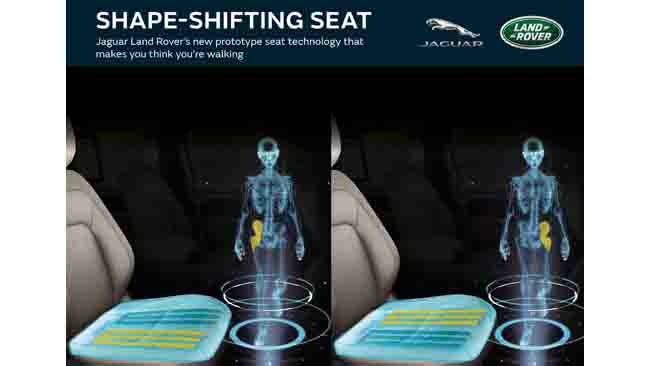
JAGUAR LAND ROVER’S NEW SHAPE-SHIFTING SEAT OF THE FUTURE MAKES YOU THINK YOU’RE WALKING
Whitley, January, 2020,
Jaguar Land Rover is developing the seat of
the future - a pioneering shape-shifting system designed to improve customer
well being by tackling the health risks of sitting down for too long.
The ‘morphable’ seat,
being trialled by Jaguar Land Rover’s Body Interiors Research division, uses a
series of actuators in the seat foam to create constant micro-adjustments that
make your brain think you’re walking, and could be individually tailored to
each driver and passenger.
More than a quarter of
people worldwide – 1.4 billion – are living increasingly sedentary lifestyles,
which can shorten muscles in the legs, hips and gluteals causing back pain. The
weakened muscles also mean you are more likely to injure yourself from falls or
strains.
By simulating the
rhythm of walking, a movement known as pelvic oscillation, the technology can
help mitigate against the health risks of sitting down for too long on extended
journeys with UK drivers covering an average of 234 km every week.
Dr Steve Iley, Jaguar
Land Rover Chief Medical Officer, said: “The wellbeing of our customers and
employees is at the heart of all our technological research projects. We are
using our engineering expertise to develop the seat of the future using
innovative technologies not seen before in the automotive industry to help
tackle an issue that affects people across the globe.”
Jaguar and Land Rover
vehicles already feature the latest in ergonomic seat design, with
multi-directional adjustments, massage functions and climate control fitted
across the range. Dr Iley has also issued advice on how to adjust your seat to
ensure the perfect driving position, from removing bulky items in your pocket,
to shoulder positioning and from ensuring your spine and pelvis are straight to
supporting your thighs to reduce pressure points. View the video here.
The research is part
of Jaguar Land Rover’s commitment to continually improving customer wellbeing
through technological innovation. Previous projects have included research to
reduce the effects of motion sickness and the implementation of ultraviolet
light technology to stop the spread of colds and flu.